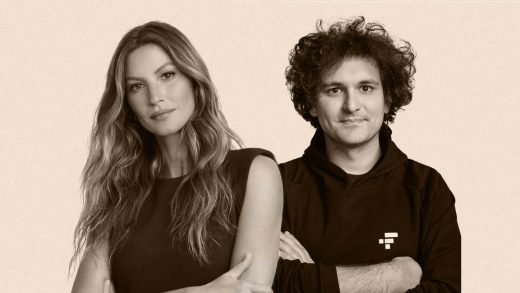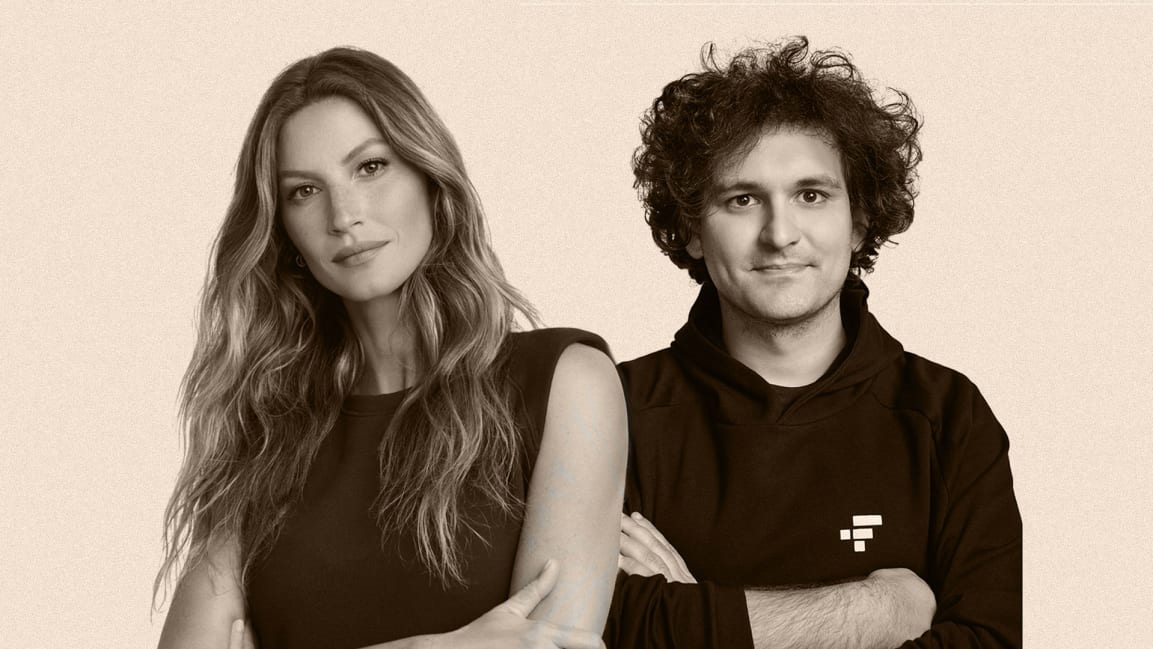Gisele Bündchen and Sam Bankman-Fried hope to sell you on crypto’s potential for good in Vogue’s FTX ads
Cryptocurrency exchange FTX has already made its play for sports fanatics, and now it’s chasing another unlikely arena for crypto converts: the glossy-magazine world of high fashion and beauty.
The trading platform, which currently serves an industry dominated by white millennial men, this week revealed an advertising campaign with its new social impact advisor Gisele Bündchen, crafted by its new “head of global luxury partnerships,” which will run in the June prints of Vogue (American and international), GQ, Vanity Fair, and The New Yorker.
Splashed across those pages, FTX founder (and world’s youngest billionaire) Sam Bankman-Fried will make his modeling debut alongside Bündchen, posing next to all-capped quotes from the pair describing how cryptocurrency can actually create “positive change” and “impact for good.”
On this, Bündchen, Bankman-Fried, and FTX are “all in”—and you should be too, the ad suggests. In February, the company unveiled a $1 billion commitment to its philanthropic arm called the “Future Fund,” which it says will invest in various projects for the greater good, including ethical development of artificial intelligence, mitigating catastrophic biorisks, eliminating global poverty, and ending animal suffering. Last June, it enlisted Bündchen, a former United Nations Goodwill ambassador and charity devotee, to aid in its mission.
At FTX’s SALT Crypto Bahamas conference Wednesday, Bündchen, who has worked with Save the Children, the Red Cross, and Doctors Without Borders in the past, told the crowd that she and Bankman-Fried share a passion for doing good.
“At the end of the day, the Earth doesn’t belong to us. We’re just here in passage,” she said. “I think it’s really important to think about what we’re leaving behind. The fact is, we’re all going to have an impact in this world—either we’re going to be part of the solution, or we’re going to be part of the problem . . . I definitely want to be part of the solution.”
So does Bankman-Fried, who has embraced the philosophy of effective altruism—which employs logic and reasoning to calculate the greatest net positive one can possibly have. “In college, I finally came to terms with the fact that there are actually things I can do that could have large impact, he said from the Bahamas. “Prior to that, I’d been trying to convince myself that maybe there was nothing, because that made it easier, then I didn’t have to worry about it . . . but it became clear that there’s an enormous impact we can have. But only if we really try.”
Cut to today, and Bankman-Fried tells Fast Company he’s now “trying to figure out how I can do the most good, and how I can maximize my positive impact on the world.” That’s also FTX’s own origin story: “I started the company so I could give back what I made, and we’re now starting to do that through the FTX Foundation,” he says, noting that the group is on track to donate $100 million this year.
A staunch utilitarian, Bankman-Fried is also aware of the power of celebrity in multiplying impact—hence, he says Bündchen might be the ideal voice for FTX. “She has an amazingly positive brand,” says Bankman-Fried. “We’re excited for her to help amplify the message, and to get people both in the industry and outside of it on board”—this time, perhaps, from the Dior-and-Chanel haute-couture demographic.
According to Bankman-Fried, their immediate focus is on environment and sustainability, which encompasses everything from “R&D on new alternative energy sources, to new technologies that could help mitigate climate change, to better monitoring of the climate impact of blockchain—and making sure that as the industry scales, its carbon footprint doesn’t scale along with it.” They also hope to attack disaster preparedness, and “how we can stop the next disease outbreak from becoming another pandemic,” he says.
But it’s crypto’s climate impact that’s been a lightning rod for the industry. Bitcoin mining and other proof-of-work protocols emit massive clouds of greenhouse gases, and that effect is expected to grow as crypto becomes mainstream and more transactions are processed each day. While FTX achieved carbon neutrality last year after purchasing $1 million in carbon offsets, it’s still an open question as to whether carbon-removal programs will be enough to counteract growing emissions.
But crypto itself isn’t all bad. As Bankman-Fried explained on stage at the Bahamas, it’s more than just a moneymaker for him to fund separate philanthropic efforts—the product has intrinsic social benefits for the world, too. For example, for people who send remittance to far-away home countries, wire transfers can take a long time and fees can cost up to 20%—with crypto, it could be instant with minimal cost. Blockchains could also support more real-time visibility into market data for even the most disenfranchised people, who are often hit with overdraft fees when there are mismatches between when their paychecks are processed and when they go to buy a loaf of bread from the store.
“If you’re just getting by, all of these awkward properties of the financial system end up costing you more than you have,” he said. “That’s a big opportunity that I’ve been spending the most of my time on with crypto: How can we create financial markets that really have equitable access for people?”
(33)



